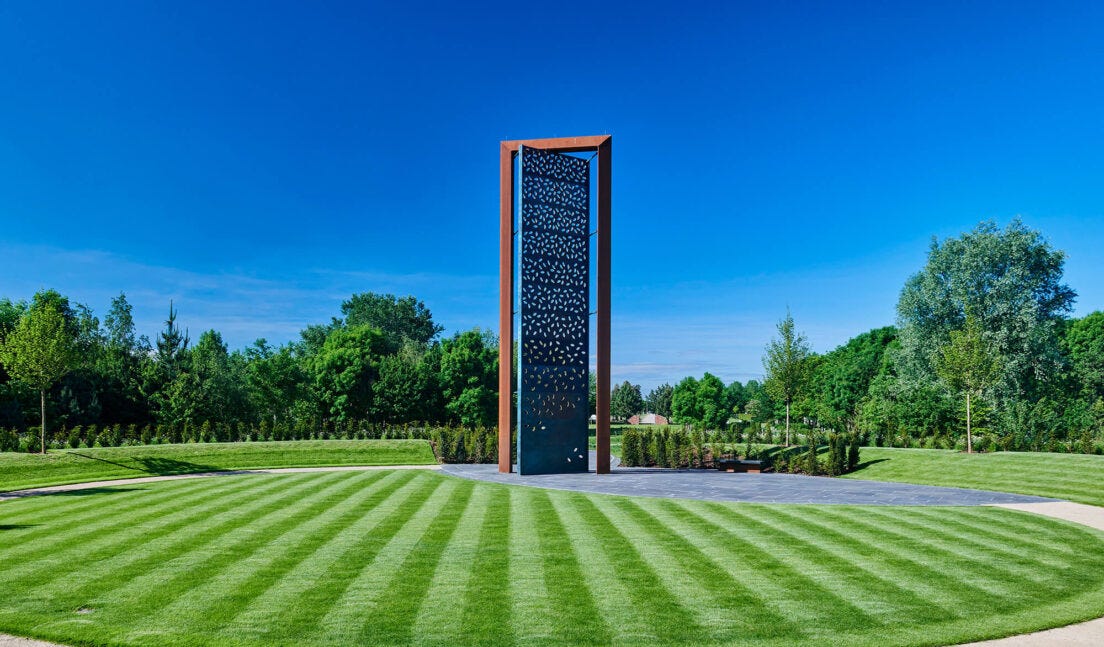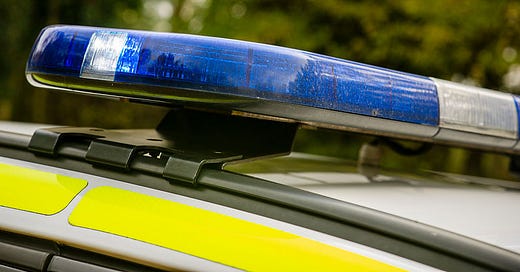Another Force Folds: Derbyshire Police Ban the Thin Blue Line
Frontline officers decry senior leaders' capitulation to activists, questioning who truly understands the cost of service.
It would appear that some Senior officers are once again putting politics before policing, sacrificing frontline morale to appease a very loud and vocal minority who actively seek to undermine law and order.
This morning, we received an email from a serving officer who wanted to remain anonymous, but their frustration speaks for thousands across the country. Apparently, Derbyshire Constabulary has now joined the growing list of police forces banning the Thin Blue Line emblem under the guise of a so-called "streamlining of uniform standards."
But let’s not beat around the bush. This isn’t really about uniforms—after all, officers are still allowed to wear other emblems without question. This is about certain senior officers who, for reasons that defy logic, seem more willing to bend over backwards for anti-police activists than to stand up for the men and women holding the line. The very people they should be backing are the ones being thrown under the rowdy bus.
Rather than defending the true meaning of the Thin Blue Line—a symbol of solidarity, sacrifice, and remembrance—these leaders are pandering to a hostile minority of professional bystanders and self-proclaimed anarchists who believe the law should not apply to them. These are individuals who go out of their way to make policing as difficult and demoralising as possible, and yet, their voices are the ones being prioritised.
Derbyshire’s decision is not an isolated one. The Metropolitan Police, the largest force in the country, banned the emblem ahead of last year’s Pride parade. Their reasoning? That a small memorial patch might be misinterpreted as allegiance to a political cause. Yet officers were still allowed to wear Pride emblems—just not Thin Blue Line emblems. That contradiction says it all. This wasn’t the conclusion of the public. This was a top-down decision from senior leadership, once again prioritising the feelings of people who don’t like the police over the feelings of those who risk their lives wearing the uniform.
To many—both inside the job and out—this isn’t leadership. It’s surrender, plain and simple.

The Thin Blue Line: A Symbol of Sacrifice, Not Division
The Thin Blue Line is not a political statement. It is not a protest. It is not a threat.
It was adopted here in the UK in 2012 after the brutal and cowardly murders of PCs Fiona Bone and Nicola Hughes in Manchester. In the face of tragedy, officers needed a symbol to grieve, to show unity, and to honour the fallen. What emerged was a quiet tribute: a black-and-white Union Jack, marked with a single blue stripe. It spoke volumes. It said, we remember. It said, we stand together. It said, we will carry on.
Got a story, video, or something on your mind?
Our team—made up of experienced former emergency services and armed forces personnel—wants to hear from you. With 350,000+ monthly views, your story could reach a wide audience.
📩 Email us: contact@emergency-services.news
📲 Seen something on X? Tag us @es_news_ or send us a DM.
But now, we have senior officers ripping this emblem away from those who wear it with pride. Not because the meaning has changed for the officers themselves, but because a small group of anti-police campaigners have decided to twist its meaning. And instead of pushing back, some chief constables have chosen the path of least resistance.
They are allowing those who have never walked the beat to define what a memorial badge means. In this ridiculous situation, people with no connection to policing are dictating the meaning of an emblem that was created by officers, for officers. And instead of standing up and saying, “That’s not what this represents,” senior leaders are staying silent, as if the Thin Blue Line is something to be ashamed of. It isn’t. It’s not political. It’s personal. It’s a tribute.
Let’s be clear. It is not up to professional bystanders on social media, activists, or armchair critics to decide what the Thin Blue Line stands for. That right belongs to the officers who wear it. Officers who have seen colleagues killed in the line of duty. Officers who go out every single day knowing they may not return home.
And let’s not forget—the Thin Blue Line isn’t the only symbol of its kind. There’s also the Thin Green Line worn by ambulance personnel, and the Thin Red Line worn by fire and rescue service workers. Both are emblems of remembrance, honouring colleagues lost in the line of duty. No one questions their right to wear them. No one accuses them of making a political statement. So why is it only the police who are being singled out? The answer should be obvious—and it should concern all of us.
Who Are Police Leaders Really Listening To?
We often talk about policing by consent in this country. But what happens when that consent is taken away from the officers themselves?
Without the brave men and women who are willing to stand the line, we don’t have policing by consent—we have chaos. And that chaos would erupt in a matter of hours. If those officers stopped turning up tomorrow, this country would descend into carnage within a day. That is not an exaggeration. It is the truth. And it’s about time police leaders started saying that out loud.
Because right now, those leaders are bending the knee to people who do not have the public's best interests at heart. They are giving ground to individuals who are determined to wear down police morale, one policy change at a time. And with each ban, each weak justification, each betrayal, officers lose a little more faith in the very people who are supposed to be standing behind them.
When a badge of remembrance becomes a battleground, we have to ask—who are senior officers really serving? The public who support their police? Or the activists who oppose them?

Two Paths, One Choice
There is a divide growing in British policing, and it is not between the public and the police. The divide is between officers on the ground and senior command teams who appear increasingly detached from the reality of the job. Unfortunately, it seems that the further up the ranks you go, the more willing you are to appease vocal minorities—even if it means sacrificing the morale and trust of your own colleagues in the process.
While Derbyshire and the Met cave to pressure, there have been moments where real leadership has shone through. In the past, some chief officers have publicly backed their teams, encouraging them to wear the Thin Blue Line as a mark of respect and remembrance. That’s what leadership should look like. Standing up for your team. Recognising what truly matters. Sadly, those voices are becoming fewer, and when they do speak up, they’re often drowned out or discredited—not always without cause, but always to the detriment of frontline morale.
And what matters is not appeasing a minority that will never support the police no matter how many times you compromise. What matters is supporting your own. Backing your officers. Defending what they stand for. And that includes their right to remember fallen colleagues with dignity.
Derbyshire’s decision, and others like it, do the opposite. They tear at the very fabric of what policing means. They tell officers their grief, their solidarity, their identity is less important than the noise coming from a few corners of the internet. And let’s be clear about who’s making that noise. These aren’t respected community voices who speak on behalf of the masses—they’re keyboard warriors and shady “auditors” whose entire existence revolves around baiting officers into confrontation just to farm clicks and cash from their followers.
They parade around with cameras, shouting about rights they barely understand, trying to goad decent officers into losing their cool. Yet the moment real trouble breaks out, they’re the first to vanish. The same people who mock and undermine the police are also the ones who cry for help the loudest when reality bites. And these are the people being listened to? These are the voices being prioritised over those who risk everything in the line of duty? It’s disgraceful. It’s weak. And it’s exactly why frontline officers feel so utterly abandoned by those in charge.
It is nothing short of a betrayal.
Enough Is Enough
If chief officers want to rebuild trust, boost morale, and strengthen public safety, then they need to remember who actually holds the line. It’s not the critics. It’s not the anti-police brigade of professional bystanders. It’s the officers who keep showing up. The ones who wear that badge with pride. The ones who know exactly what the Thin Blue Line stands for because they’ve lived it. They’ve seen their colleagues rushed to hospital after being attacked. They’ve stood at gravesides, watching families bury their sons and daughters in uniform.
To take that symbol away isn’t progress. It’s surrender—to people who will never have to pick up the pieces when everything falls apart.
If you believe in advert-free journalism that stands up for emergency services workers and calls out those who let them down, consider becoming a paid subscriber today.
OPINION: Derbyshire’s Thin Blue Line Ban: An Unnecessary Betrayal of the Fallen?
Derbyshire Constabulary’s decision to ban the Thin Blue Line emblem from police uniforms is a slap in the face to every officer who has ever put their life on the line—or lost it—for the public good. This isn’t about “streamlining standards”; it’s about some senior officers caving to a shrieking minority of anti-police agitators who’d rather see law enforcement crumble than honour its sacrifices. While these same leaders greenlight Pride badges and other emblems without a second thought, they’ve singled out a quiet tribute to fallen cops as somehow unacceptable. It’s a disgraceful double standard, and the rank-and-file know it. Want to know just how pathetic this capitulation gets? Keep reading.
Keep reading with a 7-day free trial
Subscribe to ESN Report to keep reading this post and get 7 days of free access to the full post archives.



